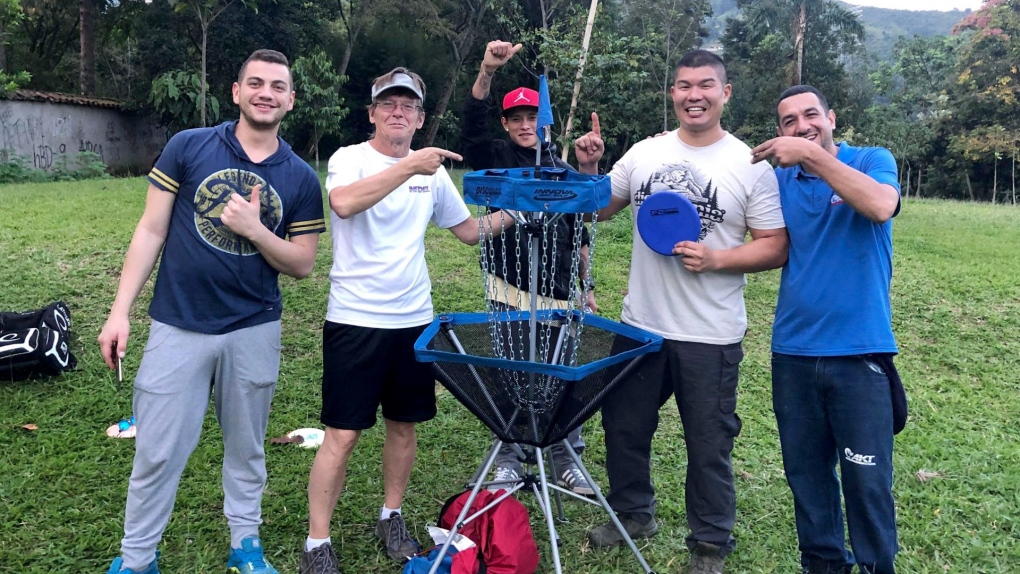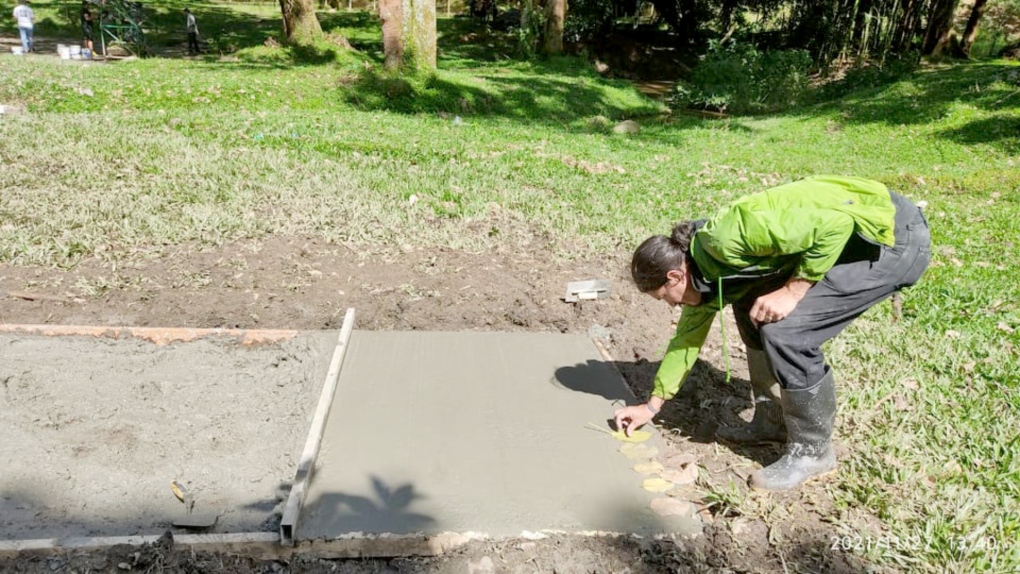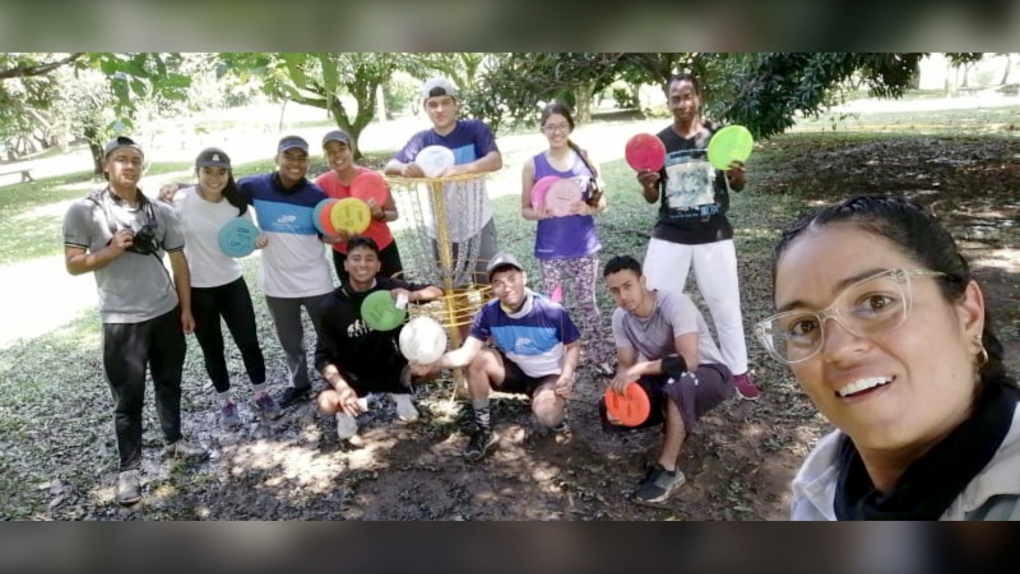Full send: How the Calgary Disc Golf Club is helping grow the sport around the world
 James Koizumi, second from right, celebrates after hitting the first-ever verified ace, or hole-in-one, at a course in Colombia, along with Ken Loukinen, second from left. (Courtesy James Koizumi)
James Koizumi, second from right, celebrates after hitting the first-ever verified ace, or hole-in-one, at a course in Colombia, along with Ken Loukinen, second from left. (Courtesy James Koizumi)
The sport of disc golf has exploded in popularity during the pandemic, namely because it's relatively easy to do and fairly inexpensive to get started.
Depending on the wind and topography of a course, those at the intermediate level and above can carry 10, 20, or even 30 discs in their bag during a round, costing about $20 each, but a beginner can get started with just one or two — a mid-range and a putter.
For most people in Canada and the U.S., that means the cost of entry into the sport represents about two to three hours of work, but for people in other parts of the world, the barrier can be much higher.
That reality hit home for Calgary Disc Golf Club president James Koizumi during a 2019 trip to Colombia — where the monthly minimum wage is just under C$300.
So he decided to do something about it.
Many disc golfers use an app called UDisc to find different courses to play, which show up as a basket icon on a map. While visiting Colombia two years ago, Koizumi, who was relatively new to the sport at the time, noticed there was only one course marked in the city of Medellin, so he reached out to the contact name connected to it and headed there for a round.
The course was a temporary nine holes put together in a park by a retired American, Ken Loukinen, who had brought a few hundred discs and some portable baskets with him when he moved to Colombia from Florida. The pair became fast friends and Koizumi even hit that country's first-ever verified ace, or hole-in-one, during his initial trip.
The reason Loukinen had brought so many discs and baskets with him, he told Koizumi, was a desire to grow the sport. Ultimate (think of a cross between football and soccer but with a Frisbee) was already somewhat popular in Colombia, but only one disc is needed to play that, as opposed to several being needed for each disc golfer.
 A worker builds a tee pad at a disc golf course in Colombia. (Courtesy James Koizumi)
A worker builds a tee pad at a disc golf course in Colombia. (Courtesy James Koizumi)
Koizumi ended up leaving the discs he had with him behind to further benefit the local players, and based on their reactions, he made a commitment to himself to fundraise for more.
Then COVID-19 happened, slowing that effort down, but it didn't stop, and this week, Koizumi is headed back to Colombia. To help celebrate his birthday in November, Koizumi hosted a fundraiser at the course in North Glenmore Park, asking participants to donate any discs or other equipment they could part with.
That brought in more than 200 discs, along with things like bags, towels and markers, which he and Lethbridge disc golfer Erik Fast are taking to Colombia to hand out, departing Dec. 7, where they will reconnect with Loukinen and spend a week playing the handful of courses now there.
"You can pick any benefit, the social benefit, the physical benefit, the mental benefit of being able to do something during COVID that's positive," said Koizumi.
"The community, the volunteer spirit … we're now sharing that globally. It's something that's going to bring worlds together, even though we don't speak the same language."
 Members of the disc golf community in Colombia. (Courtesy James Koizumi)
Members of the disc golf community in Colombia. (Courtesy James Koizumi)
The timing of this week's trip was also somewhat serendipitous for Koizumi as members of the Paul McBeth Foundation will also be in Colombia, including Paul himself, where they are also working with Loukinen to grow the game.
A five-time Professional Disc Golf Association (PDGA) world champion, McBeth is arguably the best disc golfer in the history of the fledgling sport. And Koizumi already has a connection.
While flying home from Colombia in 2019, Koizumi had a layover in Nashville to attend a friend's 40th birthday, and decided to disc golf too.
"I went to the store and bought three new discs and walked up to the course I wanted to play and sat there at first tee and was like, 'I'm going to make sure I play with a local so they can show me around the course.' I did that and guess who I ended up playing with – Jon McBeth, (Paul's) brother."
The McBeth Foundation's work in Colombia is part of efforts they're doing in four countries in 2021 — Mexico, Guatemala, Colombia and the U.S. — which includes building five courses and giving away more than 700 discs.
CTVNews.ca Top Stories

Joe Biden pardons son Hunter Biden of gun, tax charges, despite promising not to
U.S. President Joe Biden announced Sunday that he pardoned his son Hunter Biden on gun, tax charges, despite previous promises that he would not do so.
Canada Post presents union with 'framework' to reach deal as strike continues
Canada Post has presented the union representing some 55,000 striking postal workers with a framework to reach negotiated agreements, the corporation said.
'Devastating': Missing Surrey, B.C. teen found dead, family says
The family of a missing 18-year-old, who was last seen in Surrey over a month ago, says there has been a tragic end to the search.
The best tips to prepare your car for the winter
Slippery or snow-covered roads, reduced visibility and bitter cold are all conditions that can make driving difficult and even dangerous during cold weather months. CAA spoke with CTV Morning Live this week on some of the best ways you can winterize your car.
PM Trudeau 'surprised' provinces unanimous on accelerated defence spending: Ford
Ontario Premier Doug Ford says his fellow provincial leaders are united in pushing for Canada to meet its NATO defence spending targets ahead of schedule, and that Prime Minister Justin Trudeau was "surprised" to hear it.
Stellantis CEO resigns as carmaker sales continue to slump
Stellantis CEO Carlos Tavares is stepping down after nearly four years in the top spot of the automaker, which owns car brands like Jeep, Citroën and Ram, amid an ongoing struggle with slumping sales.
'Wicked' star Marissa Bode speaks out against 'harmful' ableist comments made about her character
'Wicked' actress Marissa Bode posted a video on TikTok asking for kindness after receiving ableist comments on social media.
Poilievre calls for asylum seeker cap, border plan as U.S. tariff threat looms
Conservative Leader Pierre Poilievre has demanded the federal government present a plan before Parliament to beef up border security as U.S. president-elect Donald Trump threatens to impose stiff tariffs on Canada.
Emergency crews battle large fire at Kitchener, Ont. townhouse complex
Waterloo Regional Police say Kingsway Drive will remain closed as emergency crews continue to battle a large blaze at a townhouse complex.


































